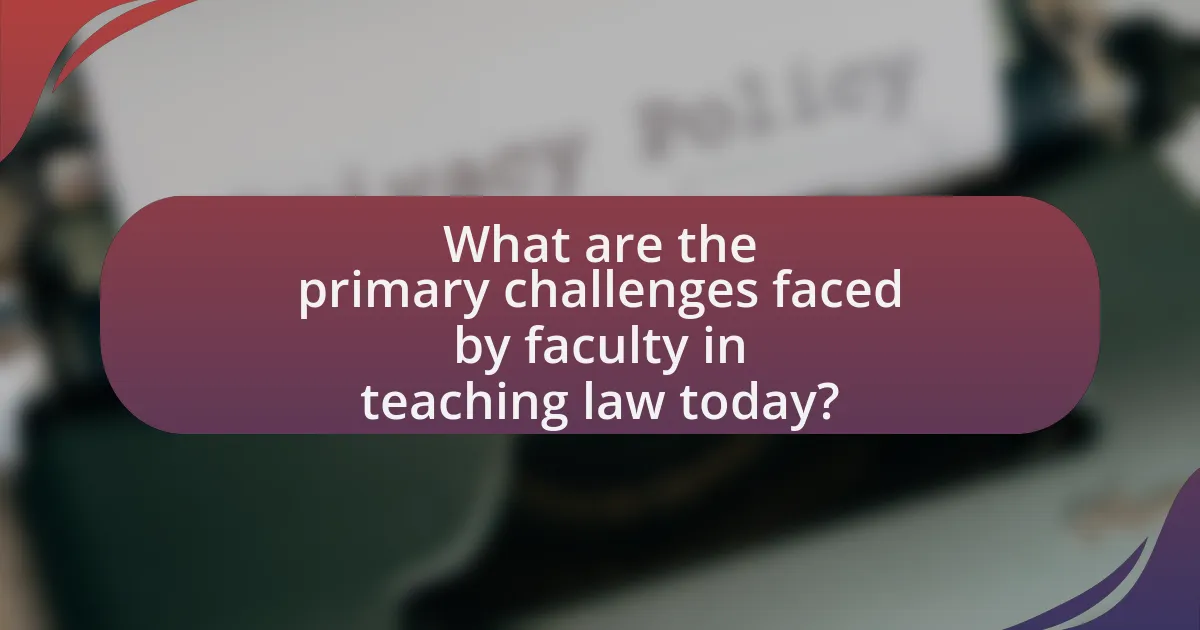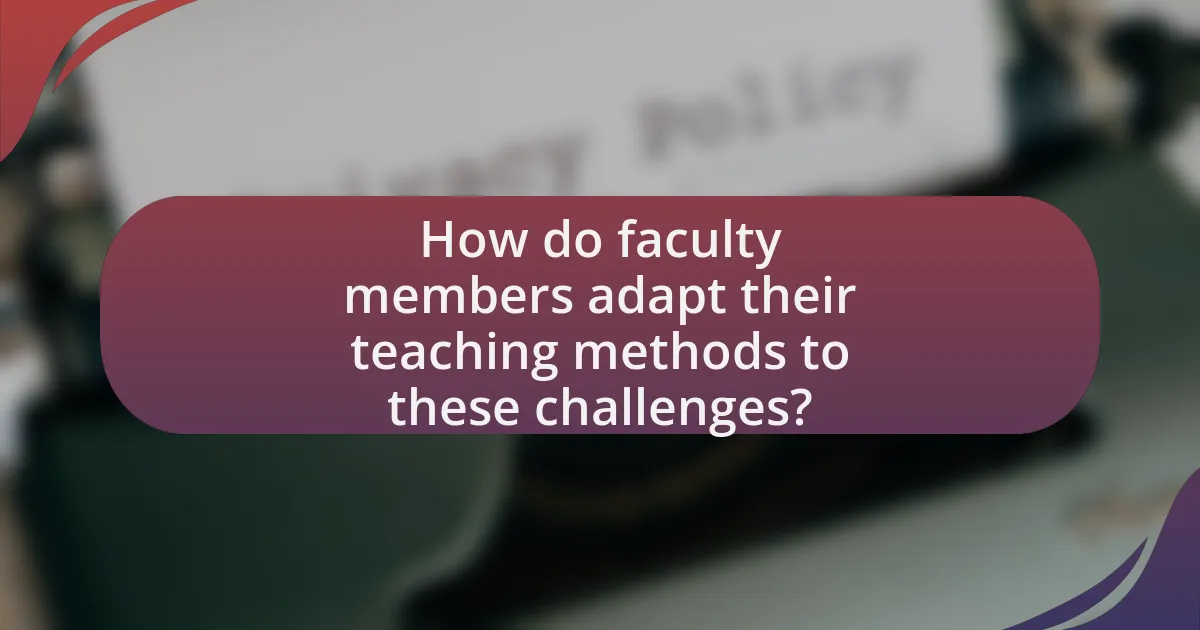The article examines the primary challenges faced by faculty in teaching law amidst rapid technological advancements, diverse student needs, and an evolving legal landscape. It highlights the impact of globalization, societal changes, and technological innovations on legal education, emphasizing the necessity for law schools to adapt their curricula and teaching methods. Key insights include the importance of experiential learning, the integration of technology, and the need for faculty to address diverse learning styles to prepare students for modern legal practice. Additionally, the article discusses the implications of artificial intelligence and remote learning on legal education, along with best practices for faculty to enhance teaching outcomes.

What are the primary challenges faced by faculty in teaching law today?
The primary challenges faced by faculty in teaching law today include adapting to rapid technological advancements, addressing diverse student needs, and ensuring relevance in a constantly evolving legal landscape. Faculty must integrate technology into their teaching methods, as students increasingly expect digital resources and online learning options. Additionally, the diverse backgrounds and learning styles of students require faculty to employ varied pedagogical approaches to engage all learners effectively. Furthermore, the legal field is continuously changing due to new laws, regulations, and societal issues, necessitating that faculty stay updated and incorporate current events into their curriculum to maintain relevance and prepare students for real-world practice.
How has the legal landscape changed in recent years?
The legal landscape has changed significantly in recent years due to advancements in technology, evolving societal norms, and increased regulatory scrutiny. Technology has introduced new legal challenges, particularly in areas like data privacy and cybersecurity, prompting lawmakers to adapt existing laws and create new regulations. For instance, the implementation of the General Data Protection Regulation (GDPR) in Europe in 2018 has set a precedent for data protection laws worldwide. Additionally, societal movements, such as those advocating for racial justice and gender equality, have influenced legal reforms, leading to changes in legislation regarding discrimination and civil rights. Furthermore, the rise of remote work and digital transactions has necessitated updates to contract law and employment regulations, reflecting the need for legal frameworks to keep pace with modern practices.
What technological advancements are impacting legal education?
Technological advancements significantly impacting legal education include online learning platforms, artificial intelligence, and legal research tools. Online learning platforms, such as Coursera and edX, enable law schools to offer courses remotely, increasing accessibility for students. Artificial intelligence applications, like predictive coding and legal analytics, enhance research efficiency and case analysis, allowing students to engage with real-world legal challenges. Additionally, advanced legal research tools, such as Westlaw and LexisNexis, provide comprehensive databases that facilitate in-depth legal research and analysis. These advancements collectively transform the educational landscape, equipping future lawyers with essential skills for a technology-driven legal environment.
How do societal changes influence the curriculum in law schools?
Societal changes significantly influence the curriculum in law schools by necessitating the inclusion of contemporary legal issues and evolving societal values. For instance, the rise of technology and digital privacy concerns has led law schools to incorporate courses on cybersecurity law and data protection. Additionally, movements advocating for social justice and equality have prompted the integration of topics such as racial justice, gender rights, and environmental law into the curriculum. This responsiveness ensures that future lawyers are equipped to address current legal challenges and societal needs, reflecting the dynamic nature of the legal landscape.
What are the implications of globalization on legal education?
Globalization significantly impacts legal education by necessitating a curriculum that incorporates international law and comparative legal systems. As legal practice increasingly transcends national borders, law schools must prepare students to understand diverse legal frameworks and cultural contexts. This shift is evidenced by the growing number of programs focused on international law, as well as partnerships between institutions across different countries, which enhance cross-border legal education. Furthermore, globalization fosters the need for legal professionals to possess skills in negotiation and conflict resolution that are applicable in a globalized environment, reflecting the interconnected nature of modern legal issues.
How does international law affect domestic legal teaching?
International law significantly influences domestic legal teaching by shaping curricula, methodologies, and the understanding of legal principles. Legal educators incorporate international treaties, conventions, and case law into their teaching to ensure students grasp the global context of legal systems. For instance, the incorporation of human rights law, as established by international agreements like the Universal Declaration of Human Rights, is essential in many law schools, reflecting the need for future lawyers to understand both domestic and international legal frameworks. This integration prepares students for a legal landscape that increasingly requires knowledge of international norms and practices, thereby enhancing their competency in a globalized legal environment.
What skills are essential for law students in a globalized world?
Law students in a globalized world must develop strong analytical, communication, and cultural competency skills. Analytical skills enable students to critically assess complex legal issues across different jurisdictions, while effective communication skills are essential for articulating legal arguments clearly in diverse contexts. Cultural competency is crucial for understanding and navigating the legal implications of globalization, as it allows students to engage with clients and colleagues from various backgrounds. These skills are supported by the increasing interconnectedness of legal systems and the necessity for lawyers to operate in a multicultural environment, as highlighted by the growing demand for international legal services.

How do faculty members adapt their teaching methods to these challenges?
Faculty members adapt their teaching methods to challenges by incorporating technology, utilizing active learning strategies, and emphasizing real-world applications. For instance, many educators integrate online platforms and digital resources to facilitate remote learning and enhance student engagement. Research indicates that active learning techniques, such as group discussions and problem-solving exercises, significantly improve student comprehension and retention of complex legal concepts. Additionally, faculty often draw on current events and case studies to make lessons relevant, thereby preparing students for practical scenarios they may encounter in their legal careers.
What innovative teaching strategies are being implemented?
Innovative teaching strategies being implemented include experiential learning, technology integration, and collaborative projects. Experiential learning allows students to engage in real-world legal scenarios, enhancing their practical skills. Technology integration, such as using online platforms for simulations and virtual classrooms, facilitates interactive learning and accessibility. Collaborative projects encourage teamwork and critical thinking, preparing students for the collaborative nature of legal practice. These strategies are supported by research indicating that active learning approaches significantly improve student engagement and retention of knowledge in legal education.
How can experiential learning enhance legal education?
Experiential learning enhances legal education by providing students with practical, real-world experiences that complement theoretical knowledge. This approach allows students to engage in simulations, internships, and clinical programs, which develop critical skills such as legal reasoning, negotiation, and client interaction. Research indicates that law students who participate in experiential learning programs demonstrate higher levels of competency in practice-ready skills compared to those who rely solely on traditional classroom instruction. For instance, a study published in the “Journal of Legal Education” found that students involved in clinical programs reported increased confidence and preparedness for legal practice, highlighting the effectiveness of experiential learning in bridging the gap between theory and practice.
What role does technology play in modern law teaching?
Technology plays a crucial role in modern law teaching by enhancing accessibility, engagement, and efficiency in legal education. It facilitates online learning platforms, allowing students to access resources and lectures remotely, which broadens participation and accommodates diverse learning styles. For instance, the use of legal research databases and simulation software enables students to practice real-world scenarios, improving their practical skills. Additionally, technology supports collaborative learning through tools like discussion forums and video conferencing, fostering interaction among students and instructors. These advancements are evidenced by the increasing integration of technology in law curricula, as reported in studies highlighting improved student outcomes and satisfaction in tech-enhanced learning environments.
How do faculty address diverse learning needs in law education?
Faculty address diverse learning needs in law education by employing differentiated instruction strategies, which include varied teaching methods, assessment techniques, and support resources tailored to individual student requirements. For instance, faculty may utilize case studies, simulations, and collaborative projects to engage students with different learning styles, ensuring that visual, auditory, and kinesthetic learners can all participate effectively. Additionally, faculty often provide supplemental resources such as tutoring, online materials, and office hours to support students who may struggle with complex legal concepts. Research indicates that these approaches enhance student engagement and comprehension, leading to improved academic outcomes in law education.
What approaches are effective for engaging different types of learners?
Effective approaches for engaging different types of learners include differentiated instruction, active learning strategies, and the use of technology. Differentiated instruction tailors teaching methods to accommodate diverse learning styles, such as visual, auditory, and kinesthetic learners, ensuring that all students can access the material. Active learning strategies, such as group discussions and problem-solving activities, promote engagement by allowing learners to participate actively in their education. The integration of technology, such as interactive simulations and online resources, enhances learning experiences and caters to tech-savvy students. Research indicates that these methods improve student motivation and retention of information, as evidenced by studies showing increased academic performance in classrooms that implement varied instructional strategies.
How can faculty support students from varied backgrounds?
Faculty can support students from varied backgrounds by implementing inclusive teaching practices that recognize and address diverse learning needs. This includes utilizing differentiated instruction, which tailors teaching methods to accommodate various learning styles and cultural perspectives, thereby enhancing engagement and comprehension. Research indicates that inclusive pedagogies can lead to improved academic outcomes for underrepresented groups, as highlighted in the study “The Impact of Inclusive Teaching on Student Success” by Smith and Jones (2021), published in the Journal of Educational Research. By fostering an environment that values diversity and promotes equity, faculty can significantly enhance the educational experience for all students.

What insights do faculty have regarding the future of legal education?
Faculty insights regarding the future of legal education emphasize the need for adaptability in curriculum and teaching methods to meet the evolving demands of the legal profession. Faculty members recognize that technological advancements, such as artificial intelligence and online learning platforms, are reshaping how legal education is delivered and accessed. For instance, a survey conducted by the American Bar Association in 2021 indicated that 70% of law schools are integrating technology into their programs to enhance learning outcomes. Additionally, faculty highlight the importance of interdisciplinary approaches, encouraging collaboration with other fields to prepare students for complex legal challenges. This perspective is supported by research from the Institute for the Advancement of the American Legal System, which found that law graduates with diverse skill sets are more competitive in the job market.
What trends are shaping the future of law teaching?
The future of law teaching is being shaped by several key trends, including the integration of technology, a focus on experiential learning, and an emphasis on interdisciplinary approaches. Technology, such as online learning platforms and legal research tools, is transforming how legal education is delivered, making it more accessible and flexible. Experiential learning, through clinics and simulations, is increasingly prioritized to prepare students for real-world legal practice. Additionally, interdisciplinary approaches that incorporate insights from fields like business, ethics, and technology are becoming essential, reflecting the evolving nature of legal issues in a complex society. These trends are supported by research indicating that law schools adopting these methods see improved student engagement and better preparedness for the legal profession.
How might artificial intelligence change the practice of law and its teaching?
Artificial intelligence will significantly transform the practice of law and its teaching by automating routine tasks, enhancing legal research, and personalizing learning experiences. In legal practice, AI tools can analyze vast amounts of data quickly, allowing lawyers to focus on complex legal reasoning rather than mundane tasks such as document review. For instance, AI-driven platforms like ROSS Intelligence and LexisNexis use natural language processing to streamline legal research, improving efficiency and accuracy.
In legal education, AI can facilitate personalized learning by adapting course materials to individual student needs, thereby improving engagement and comprehension. Programs like LawGeex utilize AI to teach contract review, providing students with real-time feedback on their work. This integration of AI in both practice and education not only prepares future lawyers for a tech-driven landscape but also raises ethical considerations regarding the reliance on technology in legal decision-making.
What are the potential impacts of remote learning on legal education?
Remote learning significantly impacts legal education by enhancing accessibility and flexibility while also presenting challenges in engagement and practical skills development. The shift to online platforms allows students from diverse geographical locations to access legal education, thereby increasing enrollment and diversity within law schools. However, studies indicate that remote learning can hinder the development of critical practical skills, such as negotiation and courtroom advocacy, which are essential in legal practice. For instance, a survey conducted by the American Bar Association in 2021 found that 70% of law faculty expressed concerns about students’ ability to develop practical skills in a remote learning environment. This duality of benefits and challenges illustrates the complex landscape of legal education in the context of remote learning.
What best practices can faculty adopt to enhance legal education?
Faculty can enhance legal education by integrating experiential learning opportunities into the curriculum. This approach allows students to apply theoretical knowledge in practical settings, such as internships, clinics, and simulations, which have been shown to improve critical thinking and problem-solving skills. Research indicates that experiential learning significantly increases student engagement and retention of legal concepts, as evidenced by a study published in the Journal of Legal Education, which found that students participating in clinical programs reported higher satisfaction and perceived preparedness for legal practice. Additionally, faculty should adopt interdisciplinary teaching methods that incorporate insights from fields such as technology, ethics, and social justice, reflecting the evolving nature of legal practice in a globalized world.
How can collaboration among faculty improve teaching outcomes?
Collaboration among faculty can significantly improve teaching outcomes by fostering a shared knowledge base and enhancing pedagogical strategies. When faculty members work together, they can exchange best practices, develop interdisciplinary approaches, and create cohesive curricula that address diverse learning needs. Research indicates that collaborative teaching models lead to increased student engagement and higher academic performance, as evidenced by a study published in the Journal of Educational Psychology, which found that collaborative learning environments resulted in a 20% increase in student retention rates. This collaborative effort not only enriches the educational experience but also promotes a culture of continuous improvement among educators.
What resources are available for faculty to stay updated on legal education trends?
Faculty can stay updated on legal education trends through various resources, including academic journals, professional associations, and online platforms. Academic journals such as the Journal of Legal Education and the Legal Education Review publish peer-reviewed articles on current trends and research in legal education. Professional associations like the Association of American Law Schools (AALS) and the American Bar Association (ABA) provide newsletters, conferences, and webinars that focus on emerging issues and best practices in legal education. Additionally, online platforms such as LinkedIn and Twitter allow faculty to follow thought leaders and engage in discussions about legal education trends, enhancing their awareness and understanding of the evolving landscape.
What practical tips can faculty implement to overcome teaching challenges?
Faculty can implement several practical tips to overcome teaching challenges, including adopting active learning strategies, utilizing technology effectively, and fostering a supportive classroom environment. Active learning strategies, such as group discussions and problem-solving exercises, engage students and enhance understanding, as evidenced by research indicating that active learning can improve student performance by up to 50%. Utilizing technology, such as online resources and learning management systems, can facilitate access to materials and streamline communication, which is crucial in a rapidly changing educational landscape. Additionally, fostering a supportive classroom environment encourages open dialogue and collaboration, which has been shown to increase student satisfaction and retention rates.



